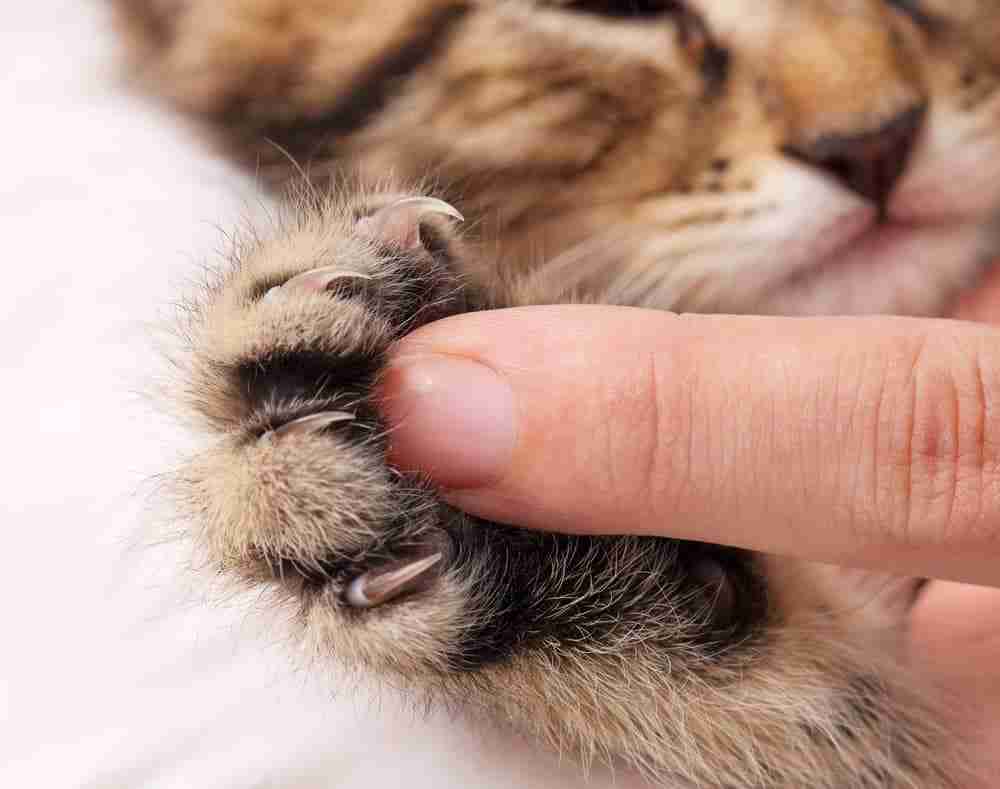Why do cats bite their nails? Is it normal for cats to bite their nails? Broadly speaking it is down to one of three reasons: normal behavior, behavioral issues, and medical-related issues. Let’s take a look in greater depth:
Are you watching your cat bite her nails? She’s chilling on the couch with her back foot in her mouth. Both front paws are holding the foot while she munches on it like a corndog at a ball game.
It’s a hilarious sight to behold, but you can’t stop yourself from wondering why she’s biting her claws in the first place? Is it boredom, or is she using her nails as a toothpick?
Cats sure are weird sometimes.
Surely there has to be a purpose for this behavior, right?
Cats Biting Their Nails Is Normal Behavior
Cats biting and chewing their claws are fairly mundane and normal behavior most of the time, so why do they all do it? The most everyday reason is that it is part of a grooming ritual :
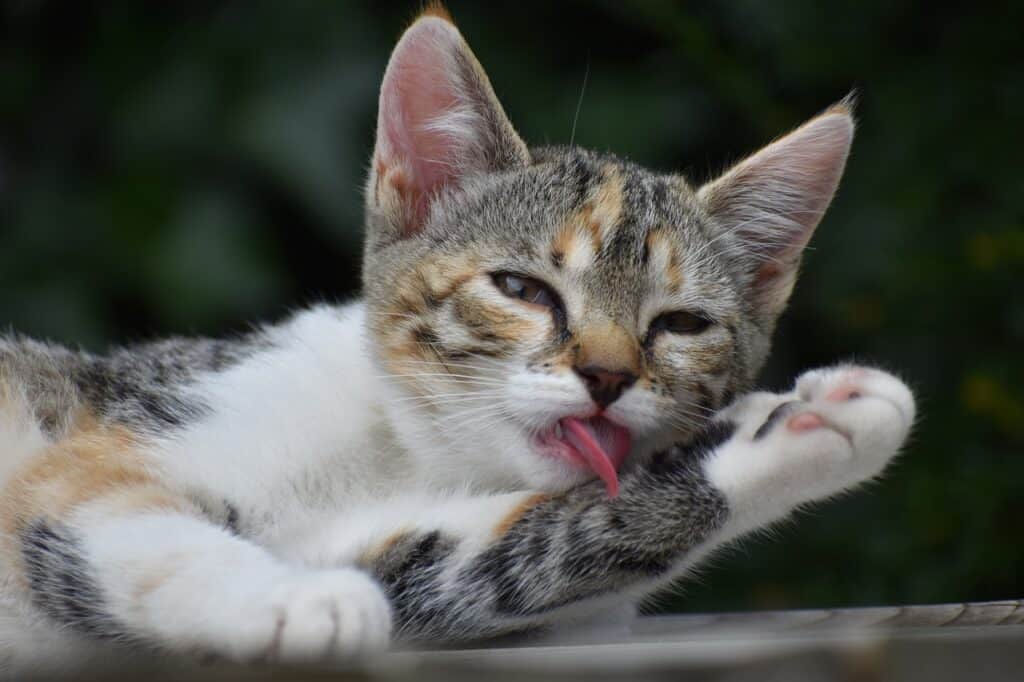
Part Of Grooming
The reality is your cat is chewing her feet because it’s part of the grooming process. Cats bite their paws to remove the old skin on their nails, revealing a new sharp claw underneath.
Think of it like the rows of teeth in a Great White shark that falls away as they dull, replaced by new teeth pushed out from the rear rows.
Your cat relies on her claws as her greatest survival tool, and they need to be razor-sharp at all times.
As a cat owner, we’re sure you noticed abandoned claws lying around the house from time to time? You might find them caught in the curtain fabrics or the couch, or their favorite scratch post.
So, what’s the deal with that?
Human fingernails grow out from the cuticle, pushing linearly to fill the nail bed. When ours get too long, we get a manicure and cut them to length.
A cat’s claw grows a sheath around the outside and gets thicker over time like ours get longer. When the claw dulls, the cat strips away the exterior layer, revealing a sharp new one underneath.
Apart from stripping back old claws to reveal fresh claws, your cat is likely to be out and about, and consequently, their feet are likely to pick up dirt and require cleaning. Some of this grooming is also attributable to maintaining clean feet not just trimming nails!
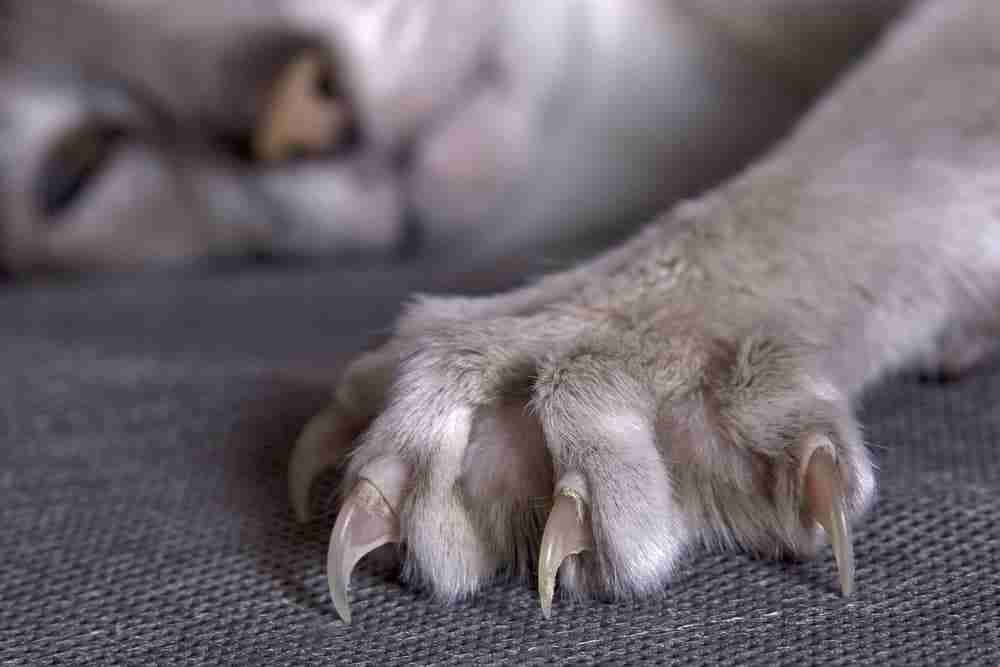
Nail Biting As A Behavioral Issue
So, now you know that your cat biting its paws is only a grooming technique and nothing to worry about with your kitty.
However, there are a few other instances where your cat might be overly-excessive with their paw grooming. Some other reasons for cats chewing their feet include the following.
Biting Nails From Stress And Anxiety
Some cats are anxious animals. Those cats that don’t get the right amount of socializing when it’s a kitten may develop psychological disorders, such as high anxiety.
The feeling cats get with anxiety is the same sensation they experience when the new owner takes them away from their mother. They worry and experience fear about not getting food or care again from their mom.
As you feed them and care for them, they lose this fear, also known as “separation anxiety.” However, cats that don’t get to play with other cats or people might find themselves afraid of all environmental stimuli as they grow up. As a result, they develop a high-anxiety disorder and start exhibiting strange, related behaviors.
Foot chewing is one of these anxiety-related issues. Sometimes it’s a mild anxiety-related problem, such as you need to play with your cat and speak to them more.
If you find your cat chewing over its anxiety issues, take her to the vet for an examination.
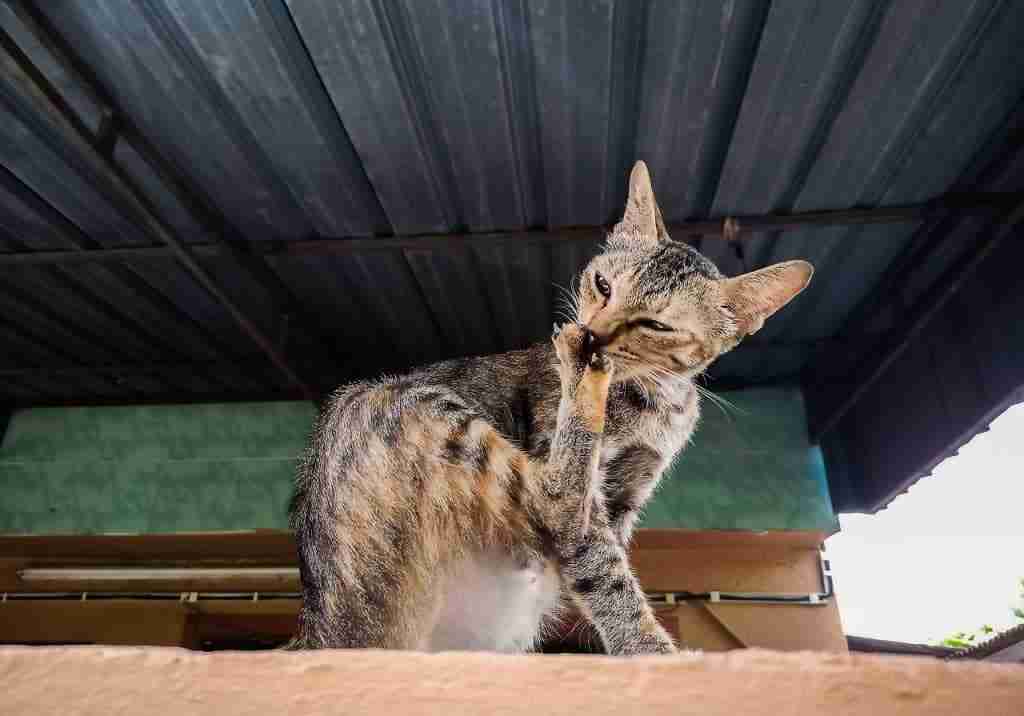
Boredom Chewing
Your cat needs emotional and physical stimulation from you. If you don’t exercise or play with your cat, it results in bouts of boredom.
Boredom is a cat’s worst enemy. As curious animals, they need mental stimulation, or they risk changes to their behavior, just as excessive claw chewing, to compensate for the lack of stimulus.
This kind of behavior is preventable by playing with your cat and speaking to them every day. Your cats rely on you for their food and shelter, but they also need your care and support.
Sure, it might look like they don’t need you, but you’re a vital part of their life and their entire reason for existence.
Taking the time to play with your cat every day is a rewarding experience for both of you. It’s a great stress-reliever and a way to bond with your animal.
Nail Biting as Compulsive Behavior
Compulsive claw chewing is a related behavior to high anxiety. However, some cats might find it hard to stop chewing their claws, even if you sort out the underlying health issue.
Once they entrench the behavior, it’s challenging to get them to reverse it. If this is a problem for your cat, we recommend speaking to a vet.
The vet will analyze the extent of the problem and make recommendations on what you can do to reverse it – if it’s possible.
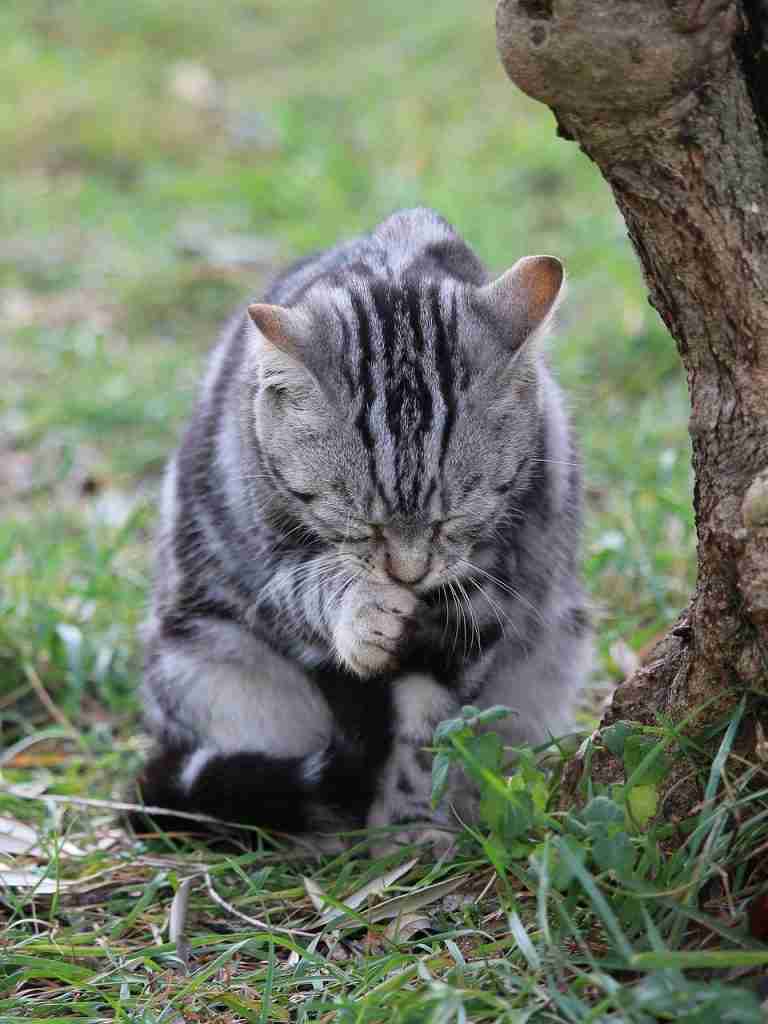
Biting Claws Due To Medical Issues
Sometimes there may be a medical issue at the heart of a behavioral problem. Here are some of the medical issues that might result in your cat biting its nails :
Injury Or Infection
Cats are crazy acrobats, and they love playing around indoors or outdoors. Your cat’s flexible spine, shoulders, and clavicles enable it to do some impressive maneuvers in the air and on the ground.
Cats are natural athletes, and they’re always ready to pounce on unsuspecting prey. Did you know your cat can pounce up to nine times the length of its body when tackling prey?
With cats being natural risk-takers with their acrobatic antics, it’s surprising they don’t experience many injuries.
If you find your cat is chewing on its claw more often than usual and isolating the behavior to a specific paw, it could be a sign of an injury or infection.
Give their paw a look, and if you apply slight pressure and they moan, it’s probably one of the two problems.
If it’s an infection, the area should feel slightly warm. If it’s an injury, your cat will protect severely and may try to bite you, depending on the level of pain they’re dealing with from the problem.
Cats are hardy pets, and they rarely protest for something that’s a minor issue. If you’re not sure about the cause of the problem, consult with your vet for advice.
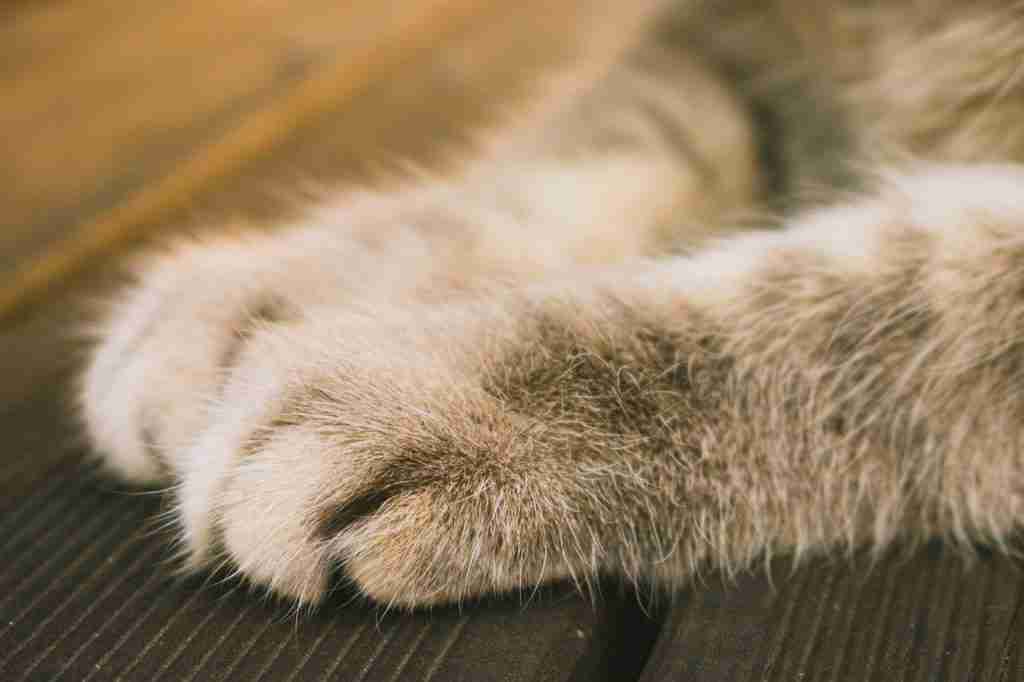
Fungal Infection – Ringworm
Ringworm is a fungal infection of the skin, hair, and nails. The fungus feeds on keratin leading to a weakening and eventual loss of hair, scaly patches on the skin, and deformation and brittleness of nails. It may be an obvious infection or can be subtle – it is relatively common in cats. If your cat is grooming their nails more than normal it could be a sign of ringworm.
If left ringworm will usually peter out of its own accord in 5-6 months. But diagnosing and treating ringworm is important because it can be spread to other pets and people in the same household. Treatment is relatively simple and usually resolves using topical treatments or pills.
Pemphigus
Pemphigus foliaceous (PF) is the most common autoimmune skin disease in cats. It may be hereditary, brought on by sun exposure, or an autoimmune response to skin cells that the immune system identifies as dead cells.
It can affect gums, lips, feet, and claws and can appear generally anywhere over the body. It is painful and irritating to your cat. It exhibits various different types. Is treated according to type but generally is treated with steroid creams. Your cat has to go on a low-fat diet due to the steroids and risk to the pancreas and remission can take as long as three months.
PF can affect your cat’s claws which may lead to overgrooming in this area.
Brittle Nails
Brittle and thick nails are most commonly seen in older cats and can be caused by bacterial infections, changes in hormones, cancers, or even just having had claws trimmed to close in the past. The associated thickening can leave your cat attempting to encourage claw sheaf shedding by chewing and biting on the thickened claws.
Wrapping Up – Why Do Cats Bite Their Nails?
The reality is claw chewing in completely normal behavior in cats. It’s part of the grooming process and nothing to concern yourself over.
However, if you find your cat is chewing its claws more often than usual, it could be due to related issues. Arrange a consultation with the vet to determine what you can do to prevent your cat from chewing on their claws.
